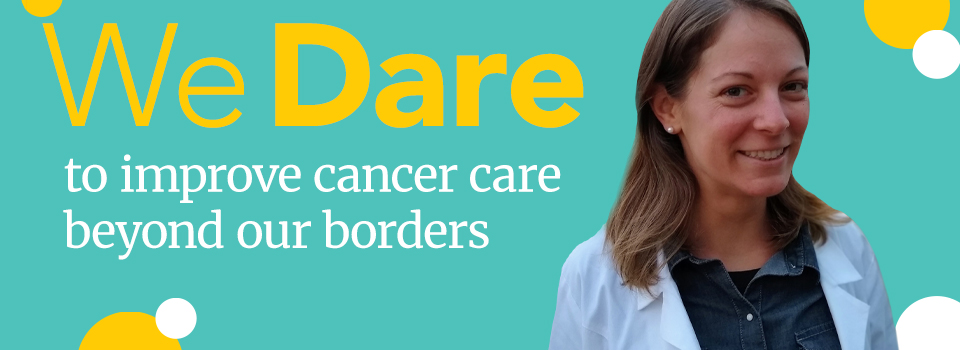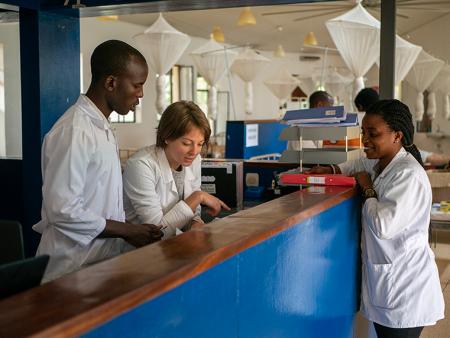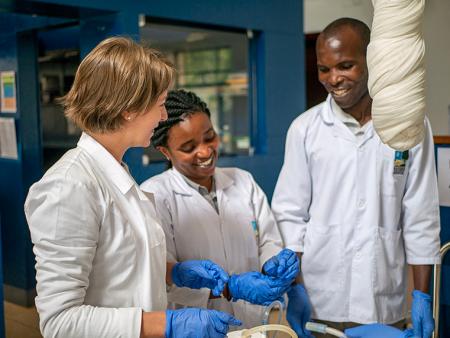We Dare to improve cancer care beyond our borders

Alumna Laura Haskins (BSN ’11) has never hesitated to change course in pursuit of her passion. She had already earned a bachelor’s in health science from Purdue University when she decided to become a nurse, finding inspiration from her colleagues as a certified nursing assistant at a residential hospice facility.
“I learned so much from my nurse colleagues, and I loved the way that they exemplified nurse advocacy and how nursing combines the personal and the scientific,” Haskins said.
After graduating from U-M’s accelerated BSN program, Haskins worked as an oncology nurse at various hospitals across the country for the next five years. In 2018, motivated by the desire to translate her expertise to support global oncology work, she became an oncology nurse educator with the non-governmental organization Partners in Health, which collaborates with national governments to provide care and strengthen public health in communities around the world. For two years in Haiti and Rwanda, Haskins was clinically embedded in the organization’s oncology service, supporting local nurses through training, quality improvement, research and one-on-one mentorship.
How U-M sparked an interest in global health
Haskins credits her global health clinical rotation as the most impactful part of her BSN studies at Michigan. The experience over three weeks in northern Ghana allowed her to learn about the country’s health care system while shadowing midwives providing antenatal care. In the West African nation, she saw how local NGOs were addressing health care issues specific to their communities, from  guinea worm eradication to mental health support, illustrating the importance of local solutions led by local staff.
guinea worm eradication to mental health support, illustrating the importance of local solutions led by local staff.
“Since we were students and visiting for such a short time, our presence was primarily to listen and learn. I believe that this cultural humility is one of the most important ethics a practitioner can carry into any global health work,” Haskins said.
A focus on cancer care
After graduating from U-M, Haskins focused her nursing career in oncology, drawn to the complexities of oncology care and the longitudinal, multimodal intensity of cancer treatment.
“For patients, it's like entering a new world with a whole new language and way of living,” she said. “I believe nurses can make such a positive impact in care by being educators and advocates, and there is huge potential in cancer care for those roles.”
Haskins embraced those responsibilities as an oncology nurse, valuing the opportunity to build connections with her patients and their families.
“One of my favorite parts of my job as an oncology nurse is sitting down with a patient and their family on the first day of chemotherapy, going through the plan of care and answering all of their questions. I can take them from anxious and confused to feeling understood and supported,” she said.
A career abroad
As she built her career as an oncology nurse in the United States., Haskins drew on her experience in Ghana and knew her skills could have an international impact.
“People often think of global health work as mostly being antenatal care and infectious disease work, but more people die globally from cancer every year than tuberculosis, AIDS and malaria combined,” she said.
Cancer incidence is growing rapidly in low- and middle-income countries as life expectancy rises and lifestyles become westernized, with increases in sedentary behaviors, high-fat diets and tobacco use. All those shifts, Haskins explained, bring new risk factors for cancer to emerge in underserved settings.
With Partners in Health, Haskins spent nine months in Haiti and 15 months in Rwanda, assisting with the development of each country’s fledgling national cancer programs. In Rwanda, for example, chemotherapy services through the national health system weren’t offered until 2012.
“Because cancer care is still so new in these countries, the rest of the system is still catching up, and there are still many myths in the society about cancer, including that it is always a death sentence,” Haskins explained. “The nurses I worked with in Haiti and Rwanda take their role as community educators very seriously, constantly speaking to their communities to break down the myths and stigmas of cancer.”
As an educator, Haskins trained local nurses in the basics of oncology care, along with many specialized skills. In contrast to the U.S., where chemotherapy medicines are usually mixed by pharmacists, nurses in Haiti and Rwanda are responsible for mixing the drugs themselves.
“The whole focus was equipping local nurses with the skills and knowledge to continue providing quality care after my departure, doing all things in partnership with them based on their priorities,” she said. “I learned so much from my nursing colleagues, and I’m so grateful they let me be part of their work.”
Haskins admits the work was emotionally challenging, as many patients in both countries present to care when their cancer has already metastasized. Beyond the emotional toll, securing stable supplies and staff also proved difficult. Essential equipment and medications were often in short supply, while turnover and burnout among nurses was a constant struggle.
“We worked really hard to celebrate the nurses and encourage them in the work every day,” Haskins said. “In my role, I wanted to send the message that what they do matters and they deserve support. Nurses are the lifeblood of health care around the world. If we want to advance quality care, investing in nurses is imperative.”
Coming home and continuing an education
In March, as the COVID-19 pandemic closed international borders and canceled flights, Haskins was called back to the U.S. But before she left, she helped coordinate pandemic planning at the cancer center in Rwanda.
“We had to think about how supply chains were going to be disrupted due to border closures, how patients would get to the cancer center with public transportation shut down, and how to move nurses around to staff COVID-19 response measures appropriately,” she said.
Over the spring and early summer months, Haskins worked for her local county health department doing COVID-19 case investigations in long-term care facilities such as nursing homes and homeless shelters. In July, she began a dual degree program at Johns Hopkins University to pursue her master’s in nursing and public health.
“It's definitely because of my global work that I decided to continue my studies,” Haskins said. “So much of my work in the U.S. was direct patient care, and being an educator opened up a whole new way of thinking. I realized I wanted to develop that side of my practice more, and graduate studies could help me do that.”
For Haskins, coming into any situation with a willingness to learn has helped her immensely, whether it was caring for patients in the United States or serving communities in the Caribbean and East Africa.
“Approach any global opportunity — or really any health care situation — as a learner first,” she advised. “We are guests in other people's lives, and we need to respect them for allowing us to be part of it for a short period of time.”





